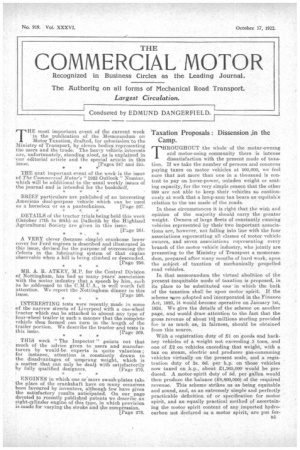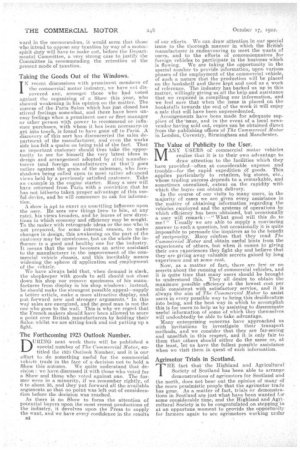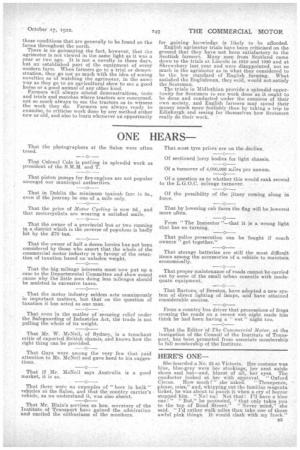Taxation Proposals : Dissension in the Camp.
Page 1

Page 2

Page 3

If you've noticed an error in this article please click here to report it so we can fix it.
THROUGHOUT the whole of the motor-owning and motor-using community there is intense dissatisfaction with the present mode of taxation. If we take the number of persons and concerns paying taxes on motor vehicles at 5:00,000, we feel sure that not more than one in a thousand is content to pay on horse-power, unladen weight or seating capacity, for the very simple reason that the other 999 are not able to keep their vehicles so. continuously at work that a lump-sum tax bears an equitable relation to the use made of the roads.
In these circumstances it is right that the wish and opinion of the majority should carry the greater weight. Owners of large fleets of constantly running vehicles represented by their two important associations are, however, not falling into line with the four associations representing all classes of motor vehicle Owners, and seven associations representing every branch of the motor vehicle industry, who jointly are presenting to the Ministry of Transport a memorandum, prepared after many months of hard work, upon the subject of taxation of mechanically propelled road vehicles.
In that memorandum the virtual abolition of the present inequitable mode of taxation is proposed, in its place to be substituted one in which the hulk of the taxation shall be upon motor spirit. If the scheme sksere adopted and incorporated in the Finance Act, 1923, it would become operative on January 1st, 1924. We give the details of the scheme on another page, and would draw attention to the fact that the gross revenue of about 10.1 millions sterling provided for is as much as, in fairness, should be obtained from this source.
With a registration duty of £1 on goods arid hackney vehicles of a weight not exceeding 3 tons, and one of £2 on vehicles exceeding that weight, with a tax on steam, electric and producer gas-consuming vehicles virtually, on the present scale, and a registration duty of 2s. 6d. per h.p. on those vehicles now taxed on h.p., about £1,365,000 would be produced. A motor-spirit duty of 54. per gallon would then produce the balance (£8,800,000) of the required revenue. This scheme strikes us as being equitable and sound, and, as an extremely simple and perfectly practicable definition of or specification for motor spirit, and an equally practical method of ascertaining the motor spirit content of any imported hydrocarbon not declared as a motor spirit, are put for
nil ward in the memorandum, it -would seem that those who intend to oppose any taxation by way of a motorspirit duty will have to make out, before the Departmental Committee, a very strong case to justify the Committee in recommending the retention of the present mode of taxation.
Taking the Goods Out of the Windows.
IN recent discussions with prominent members of the commercial motor industry, we have not discovered any, amongst those who had Voted against the organizing of a Show this year, who showed weakening in his opinion on the matter. The success of the Paris Salon which has just closed has stirred feelings somewhat, and there have been uneasy feelings when a prominent user or fleet. manager or other person with power to recommend or influence purchases, with whom it has been necessaryto get into touch, is found to have gone off to Paris. A discovery or this sort has disconcerted the sales department of the manufacturer, and even the works side has felt a qualm on being told of the fact. That an important customer should thus take the opportunity to see for himself the very latest ideas in design and arrangement adopted by rival manufacturers (and foreign manufacturers at that!) goes rather against the grain of the salesman, who foreshadows being called upon to meet rather advanced views held by a previously satisfied customer. Take an example in the engine starter. Many a user will have returned from Paris with a conviction that he has not hitherto taken proper advantage of this useful device, and he will commence to ask for information.
A show is apt to exert an unsettling influence upon the miser. He sees new things (new to him, at any rate), his views broaden, and he learns of new directions in which economy and efficiency may be sought. To the maker with retrograde ideas or the one who is not prepared, for some internal reason, to make changes in design, this awakening on the part of the customer may be unwelcome, but on the whole the influenee is a good and healthy one for the industry. It means that the user becomes an active assistant to the manufacturer in the improvement of the commercial vehicle chassis, and this inevitably means widening the sphere Of application and employment of the vehicle.
We have always held that, when demand is slack, the shopkeeper with goods to sell should not close down his shop nor remove specimens of his manufactures from display in his shop windows : instead, he should make the strongest possible appeal—supply a better article, make a More attractive display, and put forward new and stronger arguments. • In this way sales are energized, and the good man is not the one who goes to the wall. This is why we regret that the French makers should have been allowed to score a point over British manufacturers by holding their Salon whilst we are sitting back and not putting up a fight.
The Forthcoming 1923 Outlook Number.
DURING next week there will be published a special number of The Commercial Motor, entitled the 1923 Outlook Number, and it is our effort to do something useful for the commercial vehicle trade in the face of a. decision not to hold a Shaw this autumn. We .quite understand that decision: we have discussed it with those who voted for a Show and those who voted against one. The former were in a minority, if we remember rightly, of 6 to about 35, and they put forward all the available arguments so that no point was left out of consideration before the decision was reached.
As there is no Show to focus the attention of potential buyers upon the most recent productions of the industry, it devolves upon the Press to supply the want, and we have every confidence in the results B2
of our efforts. We can draw attention, in our special issue to the thorough manner in which the British manufacturer is endeavouring to meet the wants of users, and to the efforts of concessionnaires for foreign vehicles to participate in the business which is flowing. We are taking the opportunity in the specialnumber to provide -information, upon various phases of the employment of the commercial vehicle, of such a nature that the Production will be placed on the bookshelf and there kept and used as a work of reference. The industry has backed us up in this matter, willingly giving us all the help and assistance that we required in compiling our information, and we feel sure that when the issue is placed on the bookstalls towards the end of the week it will enjoy a sale that will have been unprecedented.
Arrangements have been made for adequate supplies of the "issue, arid in the event of a local newsvendor having sold out, copies can be obtained direct from the publishing offices of The Commercial Motor in London, Coventry, Birmingham and Manchester.
The Value of Publicity to the User.
MANY USERS of commereial motor vehicles realize that it is to their own advantage to draw attention to the facilities which they have provided—often at considerable expense and trouble—for the rapid expedition of goods. This applies particularly to retailers, big stores, etc., whose trading success depends to a remarkable, and sometimes unrealized, extent on the rapidity with which the buyer can obtain delivery.
In the course of -our visits to many users, in the
majority of cases we are given every assistance in the matter of obtaining information regarding the vehicles employed and the systems of operations by which efficiency has been obtained, but occasionally a user will remark : —" What good will this do to me?" -Usually we are able to supply a convincing answer to such a question, but occasionally it is quite impossible to persuade the inquirers as to the benefit of reciprocity. Many crinfess that they read The. Commercial Motor and obtain useful hints from the experiences of others, but when it comes to giving their own experiences they fight shy and believe that they are giving away valuable secrets gained by long experience and at seine cost.
Now, as a matter of fact, there are feW or no
secrets about the running of commercial vehicles, and it iS quite time that many users should be brought to understand this. They all desire to obtain the maximum possible efficiency at the lowest cost per mile consistent with satisfactory service, and it is always the aim of The Commercial Motor to assist users in every possible way to bring this desideratum into being, and the best way in which to accomplish this is for users to help us by assisting to disseminate useful information of some of which they themselves will undoubtedly be able to take advantage.
Many enterprising concerns have approached us with invitations to investigate then' transport methods, and we consider that they are far-seeing and unselfish in this respect, and it is only fair to them that others should either do the same or, at the least, let us have the fullest possible assistance when we visit them in quest of such information.
Agrimotor Trials in Scotland.
HE fact thatthe Highland and Agricultural
Society of Scotland has been able to arrange
demonstrations' of agrimotors for Scotland and the north, does not bear out the opinion of many a the more pessimistic people that the agrimotor trade has gone. As a matter of fact, trials or demonstrations in Scotland are just what have been wanted for some considerable time, and the Highland and Agricultural Society is to be congratulated on stepping in at an opportune moment to provide the opportunity for farmers again to see agrimotors working under
those conditions that are generally to be found on the farms throughout the north.
There is no gainsaying the fact, however, that the agrimotor is not viewed in the same light as it was a year or two ago. It is not a novelty in these days, but an established part of the equipment of every modern farm. When farmers go to a trial or demonstration, they go not so much with the idea of seeing novelties as of watching the agrimotor, in the same way as they go to an agricultural show to see a good horse or a good animal of any other kind.
Farmers will always attend demonstrations, tests and trials and matches where tractors are concerned, not so much always to see the tractors as to witness the work they do. Farmers are always ready to examine, to criticise work done by any method either new or old, and also to learn whenever an opportunity for gaining knowledge is likely to be afforded. English agrimotor trials have been criticised on the ground that they have not been satisfactory to the Scottish farmers. Many men from Scotland came down to the trials at Lincoln in 1919 and 1920 and at Shrewsbury last year and were disappointed, not so much in the agrimotor as in what they considered to be the low standard of English farming. What satisfied the Englishman, they said, would not.satisfy the Scotsman.
The trials in Midlothian provide a splendid opportunity for Scotsmen to see work done as it ought to be done and conducted under the auspices of their own society, and English farmers may spend their money much more foolishly than by taking a trip to Edinburgh and seeing for themselves how Scotsmen really do their work. •
































